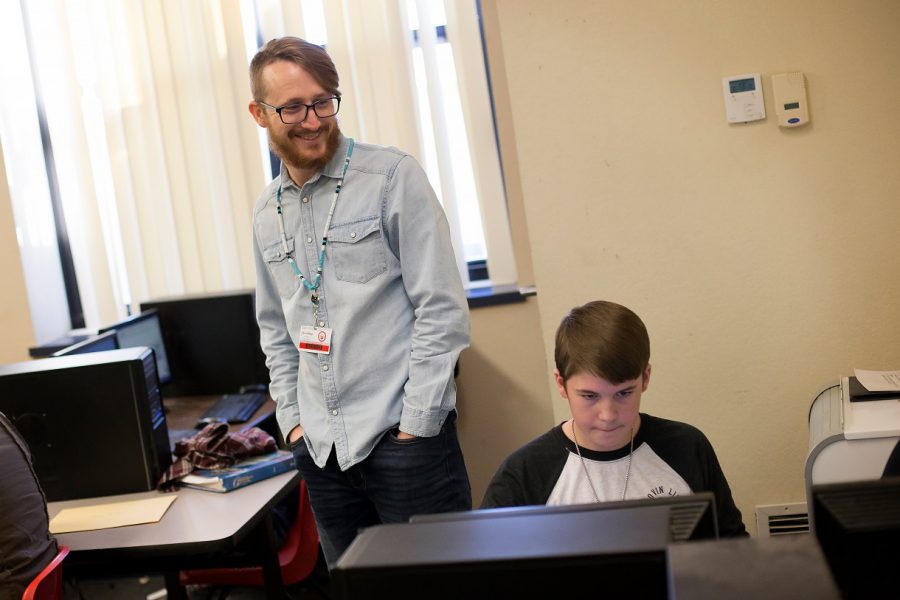
Between 2008 and 2018, Oklahoma decreased per-pupil educational funding by 28.2 percent, leading the United States in total percentage cuts to education. No other state slashed education budgets more than 20 percent. In fact, Oklahoma reduced funding by 12 percent more than Texas, which sits at second place.
Citizen Potawatomi Nation’s Education Department developed the Wzhitawen (Prepare) Project to combat negative statistics at four school districts within the Nation’s jurisdiction: Asher, Maud, Macomb and Wanette. The four-year program, provided by a grant through the Obama administration’s Native Youth Community Initiative, concentrates on four emphases: Pick Your Path, Tuition Take Down, Ace the Test and Be the Best Student.
“We want them to figure out a plan and what they define success as, whether that’s going right into the workforce or whether that’s going to tech school or going to college,” said Channing Seikel, CPN senior college adviser. “We want to have them prepared for life in general.”
She serves students at Maud and Macomb.
Regardless of a student’s interest, CPN’s Education Department helps them find a corresponding career.
“A lot of it is the students’ need to see what’s available to them,” said Josh Bullock, CPN college adviser. “We try to show them what is there, and they can choose from that. If we don’t show them what they want, and they tell us about it, I’ll go find more information on it.”
Bullock works with students in Asher and Wanette public schools districts.
The lack of funding affects essential academic and career services available, including guidance counseling. Both Wanette and Macomb asked if all their eighth and ninth graders could participate in Wzhitawen, as the two schools lack staff dedicated to helping youth plan for career and scholastic paths.
“Even non-Native students are part of what we’re doing, and we have no problem with that, at all,” Seikel said. “We’re thrilled.”
The school districts are finding creative ways to make each dollar go further.
“They’re really trying to do the best they can with the resources they have,” she said. “They just don’t have the resources, especially those very rural areas, which is where we go.”
CPN member Kade Lowden, 15, participates in the Wzhitawen Project at Asher High School, where he enjoys the opportunity to socialize and play on the baseball team. He is interested in studying journalism or finding a career in the oil and gas industry.
When asked what he hopes to get out of the program, he replied, “The future, just a decision — a good decision and guidance.”
One goal of this program is to expose participants to higher education opportunities. Last year, they traveled to the University of Oklahoma. This semester, they will visit Oklahoma State University Institute of Technology in Okmulgee. The grant covers the cost of the trip, ensuring money does not hold anyone back from participating.
OSU-IT’s degree programs include both vocational and collegiate aspects with options for associate degrees in applied science, elementary or secondary education, business and more.
“We’re taking them to see the automotive and the culinary (programs),” Bullock said. “They also have some other programs there, but we’re going to focus on the vocational side of it first.”
Many served by the Wzhitawen Project do not come from families with collegiate experience.
“We’ve seen a lot of family support and a lot of community support, but there are a lot of students who their parents went straight to work and didn’t have the vision or the dream to go to college,” Seikel said. “They’re getting to really experience a bunch of different opportunities that they didn’t know existed for them, and I think it’s important for them to see that. Their dreams are as big as they want to make them.”
In addition to academic and career planning, the program intertwines Native-based curricula and activities. Bullock noticed early on that his students, although some are Native American, not all identify as being Native American. He focuses on helping them define their Native identity and informs them of opportunities and services available to help them attain their goals.
“If there’s ever a lesson that I feel like I don’t feel adequate enough to teach, or whenever we do a talking circle, which we’ve done a couple of times, we always ask (Tesia Zientek) to complete that just to be appropriate,” Seikel said.
The talking circle provides a Native-based educational component but also gives them a platform to discuss various aspects of their lives and future with each other.
Seikel and Bullock use My ACT Prep to help the participants gain experience taking college entrance exams. The online program covers math, science, English, reading and writing and provides a platform where they can pick a personally difficult subject without added test and performance anxiety.
Another program component is teaching and instilling a sense of mentorship to carry these lessons and resources on to future classes at the four schools. The department also developed a parent curriculum and counselor/teacher guide.
“We’ve just loved this opportunity, and we see the value of it,” Seikel said. “I think that’s important is to find value in what you do. We see that every day.”
For more information:
Citizen Potawatomi Nation Department of Education
1601 S. Gordon Cooper Drive
Shawnee, Oklahoma
405-275-3121
college@potawatomi.org
